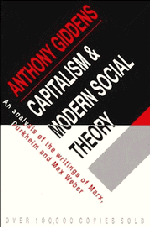Book contents
- Frontmatter
- Contents
- Acknowledgements
- Preface
- Introduction
- List of abbreviations used
- Dedication
- Part 1 Marx
- Part 2 Durkheim
- Part 3 Max Weber
- Part 4 Capitalism, socialism and social theory
- 13 Marx's influence
- 14 Religion, ideology and society
- 15 Social differentiation and the division of labour
- Postscript: Marx and modern sociology
- Bibliography of works cited in text
- Index
15 - Social differentiation and the division of labour
Published online by Cambridge University Press: 05 August 2013
- Frontmatter
- Contents
- Acknowledgements
- Preface
- Introduction
- List of abbreviations used
- Dedication
- Part 1 Marx
- Part 2 Durkheim
- Part 3 Max Weber
- Part 4 Capitalism, socialism and social theory
- 13 Marx's influence
- 14 Religion, ideology and society
- 15 Social differentiation and the division of labour
- Postscript: Marx and modern sociology
- Bibliography of works cited in text
- Index
Summary
The writings of Marx, Weber and Durkheim, in their varying ways, fuse together an analysis and a moral critique of modern society. Weber's insistence upon the absolute logical dichotomy between empirical or scientific knowledge, and value-directed action, should not be allowed to obscure his equally emphatic affirmation of the relevance of historical and sociological analysis to active involvement in politics and social criticism. Both Marx and Durkheim reject Kant's ethical dualism, and attempt more directly to integrate a factual and a moral assessment of the characteristic features of the contemporary social order. Durkheim maintained a lifelong commitment to the formulation of a scientific foundation for the diagnostic interpretation of the ‘pathological’ features of the advanced societies. Marx's work and political actions are predicated upon the argument that ‘Man must prove the truth, that is, the actuality and power, the this-sidedness of his thinking, in Praxis’.
In the works of the latter two writers, the concepts of ‘alienation’ and ‘anomie’ respectively provide the focal point of their critical interpretation of modern society. The conception of alienation is the main prop of Marx's critique of capitalism, and therefore of his thesis that the bourgeois order can be transcended by a new kind of society. It does not merely represent an early Utopian position which Marx later abandoned, nor does it become reduced to the relatively minor place which Marx's discussion of the ‘fetishism of commodities’ occupies in Capital.
- Type
- Chapter
- Information
- Capitalism and Modern Social TheoryAn Analysis of the Writings of Marx, Durkheim and Max Weber, pp. 224 - 242Publisher: Cambridge University PressPrint publication year: 1971



